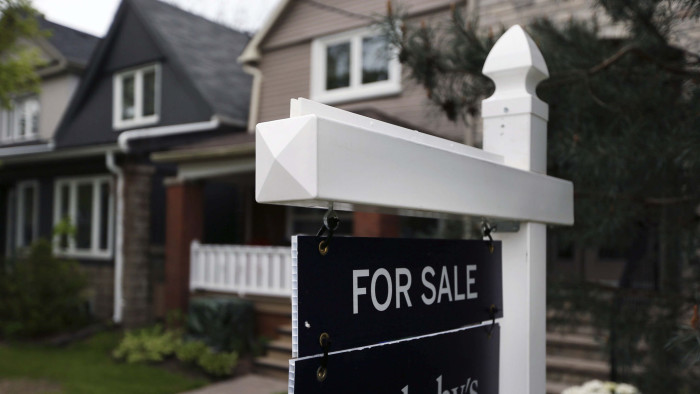Can Canada’s property market repeat the success of 2008?

Simply sign up to the Property sector myFT Digest -- delivered directly to your inbox.
For millions of Canadians, home has become a refuge in the battle to slow the spread of Covid-19. But the country is also pinning its hopes on residential property being the lifeline it was in the wake of the 2008 financial crisis, when a debt-fuelled housing boom became a driving force of the Canadian economy.
Canadian policymakers no doubt hope previous examples of the market’s resilience play out once more. In 2008, US house prices plunged by one-third; meanwhile the market in Canada dipped just 8 per cent before rebounding on the back on ultra-low interest rates. Canadian households now own $5.7tn worth of property assets, according to Statistics Canada, nearly three times more than 15 years ago.
Yet the near freeze on house buying has heaped pressure on to many of the nation’s property agencies. “It’s challenging, but I see silver linings in the low mortgage rates and the measures the government have taken to support the market,” says Roy Almog, founder of 2 Percent Realty, based in Calgary, Alberta. “I don’t see a crash or foreclosures happening.”
But property-obsessed Canadians are among the most indebted in the developed world, with debt at 101.6 per cent of GDP in the last quarter of 2019, according to the Bank for International Settlements. And with unemployment expected to hit 15 per cent in the second quarter, that leaves the market in a precarious state going into this recession.
When Canada went into lockdown in March, home sales fell 14.3 per cent from the previous month. April is expected to be worse — a mid-month update from the Toronto Real Estate Board showed sales down 69 per cent from the year before. Yet prices held up relatively well, down just 1.5 per cent, demonstrating that even in the face of a pandemic many are still willing to pay top dollar for property.
Mr Almog launched 2 Percent Realty in 2007 out of frustration when trying to sell his home. He was faced with either going it alone or paying a “hefty price tag” in commissions to a realtor, he says, which in Canada can amount to 5 or 6 per cent.
The company now ranks 483 on the FT Americas’ fastest-growing companies list, compiled by Statista, a research company, which ranks 500 businesses by their 2015-18 compound annual growth rate (CAGR).
Many of the 19 property companies on the FT list share an embrace of technology, which in Canada is helping to disrupt traditional brokerage models that continued to rely on fax machines and printers long after other industries phased them out.
Zoocasa started life in 2008 as an online real estate listings aggregator. Yet after a string of losses its parent company, telecom giant Rogers Communications, closed it down in 2015. That was when Lauren Haw and a group of technology and property investors bought the brand and its platform.
They built a boutique Toronto brokerage around it, in which online tools for buyers and sellers were combined with more than 100 agents. The data-driven company now ranks 84th on the FT list thanks to a 2015-18 CAGR of 127.3 per cent.
Like Mr Almog, Ms Haw believes the housing market will prove resilient in the face of economic upheaval. “The initial couple of weeks was scarier than where we are now,” she says. Bidding wars are returning, she adds, albeit with three prospective buyers instead of 30, as was the case in February.

For Sterling Wong, president of Search Realty Corp, the online property agency near Toronto was in a good position before the Covid-19 disruption because all its systems were already online.
Frustration with the lack of innovation at the traditional brokerage he worked at previously drove him in 2012 to launch his own business — which places 224th in the ranking with a compound growth rate of 54.2 per cent. “Most of the real estate industry still believes in door knocking, so this is really working to our advantage,” he says.
His focus now is on rolling out its Google-powered, lead-generating platform as a fee service to other property agencies. He is in the process of closing a deal with a national brokerage in Canada, he says, and plans to expand the service in the US.
Mr Almog is also poised to take 2 Percent Realty into the US market, where he sees a similar gap between the do-it-yourself approach and higher-cost national brokerages — though he has hit pause on plans until the impact of Covid-19 recedes.
“When things start to normalise, whatever that new normal will be, I think housing will [return to the] forefront for a lot of people as they take advantage of low mortgage rates they couldn’t get a year ago,” Mr Almog says.
Nevertheless it is a wager as to whether Canada’s housing market can prove as resilient against this pandemic-led recession as it did during the financial crisis.

Comments